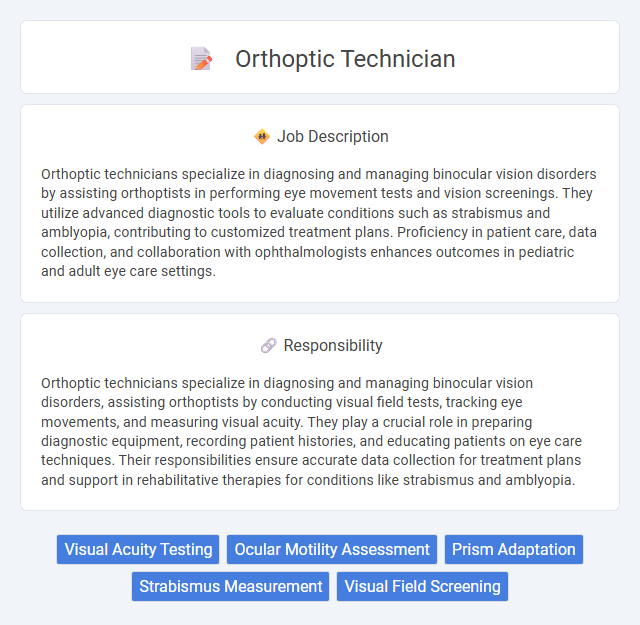
Orthoptic technicians specialize in diagnosing and managing binocular vision disorders by assisting orthoptists in performing eye movement tests and vision screenings. They utilize advanced diagnostic tools to evaluate conditions such as strabismus and amblyopia, contributing to customized treatment plans. Proficiency in patient care, data collection, and collaboration with ophthalmologists enhances outcomes in pediatric and adult eye care settings.
Orthoptic technician roles may be more suitable for individuals who have a keen interest in eye health and visual disorders, as well as strong attention to detail and good communication skills. Those who can handle routine diagnostic procedures and work closely with patients exhibiting various ophthalmic conditions are likely to find the job fulfilling and manageable. People with a background in healthcare or a willingness to learn specialized technical skills may have a higher probability of success in this profession.
Qualification
Orthoptic technicians require a diploma or associate degree in orthoptics or a related field, combined with practical training in eye care diagnostics. Certification from recognized bodies such as the American Orthoptic Council enhances job prospects and demonstrates proficiency in diagnosing and managing binocular vision disorders. Strong knowledge of ocular anatomy, visual function tests, and patient handling is essential for successful career performance.
Responsibility
Orthoptic technicians specialize in diagnosing and managing binocular vision disorders, assisting orthoptists by conducting visual field tests, tracking eye movements, and measuring visual acuity. They play a crucial role in preparing diagnostic equipment, recording patient histories, and educating patients on eye care techniques. Their responsibilities ensure accurate data collection for treatment plans and support in rehabilitative therapies for conditions like strabismus and amblyopia.
Benefit
Orthoptic technicians likely enjoy substantial benefits such as competitive salaries and opportunities for professional growth within specialized healthcare fields. They may also experience job stability and satisfaction by helping patients improve their vision and eye coordination. Access to cutting-edge technology and continuous training could further enhance their career prospects and skill sets.
Challenge
Orthoptic technicians likely face the challenge of accurately diagnosing and assisting in the treatment of complex visual disorders, requiring strong attention to detail and patient communication skills. The role probably demands continuous learning to keep up with advancements in eye care technology and methods. Managing diverse patient needs and ensuring precision in diagnostic tests could be ongoing challenges in this specialized healthcare field.
Career Advancement
Orthoptic technicians play a crucial role in diagnosing and treating visual disorders, providing a strong foundation for career growth in ophthalmology and vision science. Gaining specialized certifications or pursuing advanced degrees in orthoptics or optometry can open pathways to senior clinical roles, research positions, and teaching opportunities. Continuous professional development and experience with cutting-edge diagnostic technologies significantly enhance prospects for leadership and specialist roles within healthcare institutions.
Key Terms
Visual Acuity Testing
Orthoptic technicians specialize in conducting Visual Acuity Testing to assess and diagnose vision clarity and eye function accurately. They utilize standardized eye charts and advanced diagnostic tools to measure the sharpness of a patient's vision, ensuring precise data for optometrists and ophthalmologists. Proficient in patient communication and test administration, orthoptic technicians play a crucial role in detecting conditions like amblyopia and strabismus through detailed visual acuity assessments.
Ocular Motility Assessment
Orthoptic technicians specialize in ocular motility assessment, employing advanced diagnostic tools like prism bars and synoptophores to evaluate eye movement disorders. Their expertise is crucial for detecting conditions such as strabismus, nystagmus, and amblyopia by measuring binocular coordination and muscle function. Accurate ocular motility evaluations by orthoptic technicians enable precise treatment planning and effective management of visual impairments.
Prism Adaptation
Orthoptic technicians specializing in prism adaptation assist in diagnosing and managing binocular vision disorders by measuring and adjusting prism lenses to correct eye alignment. They perform detailed assessments to determine the optimal prism strength that alleviates symptoms of diplopia and improves ocular comfort. Expertise in prism adaptation protocols and collaboration with orthoptists ensures precise treatment plans tailored to individual patient needs.
Strabismus Measurement
Orthoptic technicians specializing in strabismus measurement use precise tools such as the Hirschberg test, prism cover test, and synoptophore to evaluate ocular misalignment and binocular vision dysfunction. They assist ophthalmologists in diagnosing and quantifying the angle of strabismus, enabling accurate treatment planning including corrective lenses or surgical intervention. Expertise in interpreting measurement data and patient responses plays a critical role in effective strabismus management and improving visual outcomes.
Visual Field Screening
Orthoptic technicians specialize in Visual Field Screening, performing precise assessments to detect and monitor vision impairments such as glaucoma or neurological conditions. They operate automated perimetry devices, accurately mapping the patient's peripheral vision to identify blind spots or field defects. Their expertise supports ophthalmologists and optometrists in diagnosing visual field loss and planning appropriate treatment strategies.
 kuljobs.com
kuljobs.com